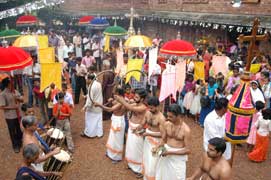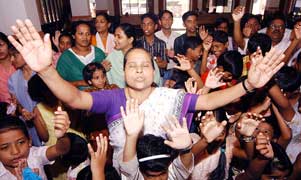Holy Ghost on the Malabar Coast
by Ka Shaji, Tehelka, October 27, 2007
|
The mainstream church in Kerala is seeing a rapid erosion in its ranks as proselytising Pentecostal groups exploit discontent among the faithful.
|
I am the way, the truth and the life. No one comes to the Father except through me. --
The Gospel according to St John, 14:16
 |
| Rallying call A traditional ceremony at an Episcopal church Photo: SK Mohan |
THERE WAS no disunity among the 12 apostles of Jesus Christ over the path to salvation. As far as they were concerned, Christ took the form of man to establish the church as part of the divine plan to ensure salvation to all. Unity, alas, has not been granted to multitudes of lesser mortals in Kerala. The state has 60.5 lakh Christians — the highest concentration in the country. But today the faithful are confused as to which path to follow. Adding to their confusion are numerous Pentecostal denominations, each suggesting separate ways to the eternal life. In a bid to protect their “originality”, the new-age Pentecostals are also fighting an internecine war of words, blaming each other for diluting the true meaning of faith and worship.
The Pentecostal movement’s growing clout has alarmed the Syrian Christian church, which commands the largest following. Several of its denominations — like the Jacobites and Marthomites — have witnessed a sharp erosion in their ranks.
Many of the laity feel the mainstream church isn’t doing enough to address contemporary concerns. “The organised church is a big failure in addressing the spiritual needs of the laity. They will be finished if there is no deep introspection,’’ opines KG Jacob, who recently converted to the Assemblies of God, a Pentecostal denomination.
Why are the faithful fleeing? The mainstream clergy once used to accuse the Pentecostals of stealing their flock. That doesn’t hold true any more. Very few return after crossing over, so the switch can no longer be claimed to be impulsive or money-driven. “Personalised evangelism” is the buzzword among those preaching an alternative Christianity that is at times a frenzied challenge to the established church. Says KV Pathrose, a recent convert from Sulthan Bathery in Wayanad, “I was an alcoholic and when my church ignored me, a friend brought a Divine Feast pastor to my house. In a matter of three days, I was a transformed man.”
The Pentecostal groups are bringing about a major attitudinal shift among Kerala’s churchgoers. Catholics and Syrian Christians, bred on the sacrosanct tenet of the Immaculate Conception, are now embracing the Pentecostals who shun that dogma.
Tiruvalla in Pathanamthitta district is the breeding ground of most of the Pentecostal outfits. This small town has India’s highest number of bank branches and ATMs thanks to a strong NRI population. Many NRIs get influenced by Pentecostal teachings outside India and force their families here to convert. Kumbanad near Tiruvalla is the headquarters of
the Indian Pentecost Council (IPC). It is also the headquarters of the Atmeya Yatra Movement, a new-age church set up by millionaire evangelist KP Yohannan. Once the citadel of Mar Thoma and other Syrian Christian groups, Kumbanad has turned into Pentecostal country. The same phenomenon has happened in Kozhikode district’s Nellipoyil, a small village that is home to about seven denominations.
“Prayer fellowships are attracting men and women to the otherwise fundamentalist Pentecostal outfits,’’ pointed out Shaju Philip, a Kozhikode-based journalist. Father Paul Parathazham, a professor of sociology at the Papal Seminary in Pune, surveyed “flock stealing/ flock desertions” in 2002, and says the Church should be “perturbed” by the phenomenon. His study located three reasons for the exodus: the absence of Christian fellowship in mainstream churches, an inability to “experience” God, and a decreasing exposure to the scriptures.
Parathazham’s report prompted the Catholic Bishops’ Conference of India to issue a set of guidelines — conceding that there were “unmet religious needs of the faithful” and asking for prayers to be made more spontaneous, appealing and personalised. The church has also sought initiation of the BCC — Basic Christian Community — movement through family units for closer interaction. The organised church says most conversions are taking place for pecuniary benefits and overseas funding. “We have no counter-strategy for the Pentecostals’ delirious, limb-shaking sessions. The situation is grim, though,” says one priest. Concurs Fr Paul Thelekkat, spokesperson of the Syro-Malabar Church: “I’m afraid it all looks like a kind of opiate. The Church cannot entice believers through gimmicks.”
 |
| New faith Prayer congregation at a Pentecostal church PHOTO: SK MOHAN |
ACCORDING TO Eapen Thomas, the treasurer of the Indian Pentecostal Church of God, his outfit has about 2,500 small and big churches all over Kerala. The Indian Pentecostal Church of God and the Assemblies of God are the front-runners while about 800 small groups also remain active. “Today we are five lakh in number and the growth appears to be tremendous in recent years. Maybe it is because there is growing unrest in most frontline traditional churches,” says Sam Kuzhikala, media coordinator of the IPC. Divine Feast, a Pentecostal church that opened in Kottayam just three years ago, has grown to a congregation of 8,000 in the town alone.
Apart from established Pentecostal churches, there are many independent fellowship groups that regularly congregate at homes. Their members are unhappy with mainstream churches but are not fully integrated with the Pentecostal establishment. One such group is the Heavenly Feast, which is popular among neo-converts since it permits members to wear jewellery, unlike the more austere Pentecostals.
But the Pentecostal progress has had its repercussions. The Hindutva brigade, which finds its streetcorner hallelujahs and barbs at Hindu gods offensive, has often retaliated. Joseph William Cooper, a bishop in the New Jerusalem Universal Church, a Pentecostal fellowship with its headquarters in Ohio in the United States, was injured in an attack on a ministry near Thiruvananthapuram in January 2003. Such was his zeal that Cooper told Ohio newspapers that his hand was “healing nicely” from the machete cut he received in Kerala, and “if the Lord wants me to return, I‘ll still go back”.
WRITER’S E-MAIL
shaji@tehelka.com
|
 Home
Home Archives
Archives
